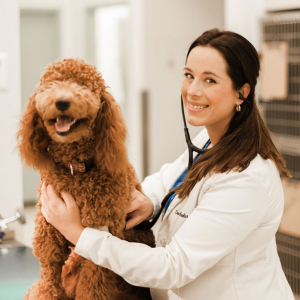Dr. Courtney Wheeler was born and raised in New Orleans and always dreamed of becoming a veterinarian. Every Career Day at school she dressed up as a vet, and in her free time she was riding her horse or playing with her dogs and cats. When she was little, Wheeler loved helping her uncle, Dr. Kelly Chapman, at the old River Road Veterinary Hospital. Inspired by him, she made her dream a reality and gratefully purchased the hospital from him. She promises that the same great care Dr. Chapman provided for his patients, clients, and staff for over forty years will continue to be her number one priority.
Dr. Wheeler received a BS in Animal Science from LSU and her Doctorate of Veterinary Medicine from Ross University School of Veterinary Medicine on the island of St Kitts and Nevis in the Caribbean. She graduated with High Honors and was inducted into the Honor Society of Veterinary Medicine, Phi Zeta. She performed her clinical year at Colorado State University in Fort Collins, Colorado.
She and her husband Chase moved back to New Orleans in 2019 after completing her clinical year and she began practicing with her uncle. She is excited to follow her passion of implementing modern, integrative and preventative medicine and has a special interest in small animal ophthalmology and surgery. Dr. Wheeler is focused on providing a stress-free environment for both clients and patients during their visits. Presently, she is redesigning the interior of the clinic to be to help reduce stress during pets’ visits. She is certified in medical acupuncture therapy and is also passionate about client education.
Her hobbies include riding and competing in hunter and jumper events with her horse and going to local dog sport competitions with her two Labrador Retrievers. They participate in sporting events like Barn Hunt, where pups get to sniff out and find rats; Fast Coursing Ability Test, a timed 100-yard dash where dogs run one at a time chasing a lure; and dock diving, a dog competition that combines speed, agility, and the ability to leap long distances!
When asked about what pet owners should keep in mind during the holidays, Dr. Wheeler reported that there are five holiday-related veterinary emergencies to be aware of and thus hopefully avoid. For many people, decking the halls and preparing festive feasts are favorite holiday traditions. Still many of these customs can be dangerous for our pets. From toxic foods to hazardous décor, pet owners should take caution when preparing for the holiday season.
During the holiday season, everyone growing up in Louisiana knows we like to center celebrations around food! While we love to sometimes overindulge with all the fixin’s, it is important to know that our pups cannot handle human food the same way that we can. If they overindulge in fatty foods they can develop a potentially life-threatening condition called acute pancreatitis, an inflammation of the pancreas. Although this condition commonly affects dogs that are middle-aged and overweight, it can affect any dog—even cats! Symptoms can range from mild to severe including vomiting, loss of appetite, lethargy, abdominal pain and discomfort, respiratory difficulty, and even collapse and life-threatening shock. Not surprisingly, pancreatitis is exceedingly common during the holiday season. Before slipping your pet a serving of turkey and gravy this season, remember that pancreatitis is a severe and life-threatening disease that can mimic other milder gastrointestinal illnesses. Monitor your pet for vomiting, diarrhea, a hunched appearance, a bloated abdomen, lack of appetite and weakness or lethargy.
Some of the most popular holiday décor can also be the most hazardous. While string lights may seem like the perfect accompaniment to a Christmas tree or mantle, they also mimic tempting toys for cats. Chewing on lights or other appealing electrical ornaments can lead to oral burns or a lethal electric shock. Menorahs and other candlelit décor pose fire risks to both pets and the home. If possible, refrain from using these items in homes with pets, or place them on sturdy, elevated surfaces out of your pet’s reach and don’t leave your pet unattended with them.
Gastrointestinal obstruction can occur along the GI tract when pets swallow foreign objects, or items that their bodies cannot digest properly. This is a common ailment around the holidays and often requires surgery. Younger pets, who often explore with their mouths, may be more prone to GI obstruction. Ribbons, tinsel, and other stringy objects can lead to a linear foreign body obstruction. This happens when these objects are ingested and propelled along the intestinal tract, causing the bowel to bunch and possibly tear. This type of obstruction is particularly common in cats who are attracted to long, string-like objects. Meat bones are common holiday treats for dogs, but they can cause serious gastrointestinal problems. Large pieces of bone can easily obstruct the GI tract or become lodged in the palate of the mouth. Giving your dog a bone can also lead to bloody diarrhea, vomiting and other unpleasant symptoms. Yeast dough often expands in the warm, moist stomach environment. This can lead to painful bloating and possible torsion or obstruction. Additionally, the gastric juices may ferment the dough, putting pets at risk for intoxication or alcohol poisoning.
While many rich, fatty holiday foods can cause gastrointestinal and pancreatic illnesses, some are toxic to our furry friends. Some common holiday plants may be potentially toxic to dogs and cats and should be avoided. Garlic and onions can lead to anemia in pets who eat them. Grapes and raisins may cause kidney failure in small animals. Chocolate contains two toxic substances, caffeine and theobromine, which can cause vomiting, diarrhea, increased thirst, panting, restlessness, increased heart rate, muscle tremors, seizures and heart failure. The darker the chocolate, the more dangerous for dogs. Nuts, especially walnuts and macadamia nuts, are high in fat and can cause gastrointestinal upset and pancreatitis. Xylitol is a sugar substitute that can cause dangerously low blood sugar levels and is found in many baked goods and candies. It may even be hiding in your favorite peanut butter brand. Mistletoe and holly may be festive, but they can cause nausea, vomiting, and even cardiac problems. Cats are especially sensitive if they ingest lilies and can suffer severe and potentially fatal kidney disease.
If you do encounter a veterinary emergency, immediately bring your pet to River Road Veterinary Hospital at 3501 River Rd, and call (504) 838-0288. Dr. Wheeler and her staff can be trusted to provide the care needed for your pet during an emergency, annual wellness visits, or whatever need may arise with your fur baby.
Dr. Wheeler received a BS in Animal Science from LSU and her Doctorate of Veterinary Medicine from Ross University School of Veterinary Medicine on the island of St Kitts and Nevis in the Caribbean. She graduated with High Honors and was inducted into the Honor Society of Veterinary Medicine, Phi Zeta. She performed her clinical year at Colorado State University in Fort Collins, Colorado.
She and her husband Chase moved back to New Orleans in 2019 after completing her clinical year and she began practicing with her uncle. She is excited to follow her passion of implementing modern, integrative and preventative medicine and has a special interest in small animal ophthalmology and surgery. Dr. Wheeler is focused on providing a stress-free environment for both clients and patients during their visits. Presently, she is redesigning the interior of the clinic to be to help reduce stress during pets’ visits. She is certified in medical acupuncture therapy and is also passionate about client education.
Her hobbies include riding and competing in hunter and jumper events with her horse and going to local dog sport competitions with her two Labrador Retrievers. They participate in sporting events like Barn Hunt, where pups get to sniff out and find rats; Fast Coursing Ability Test, a timed 100-yard dash where dogs run one at a time chasing a lure; and dock diving, a dog competition that combines speed, agility, and the ability to leap long distances!
When asked about what pet owners should keep in mind during the holidays, Dr. Wheeler reported that there are five holiday-related veterinary emergencies to be aware of and thus hopefully avoid. For many people, decking the halls and preparing festive feasts are favorite holiday traditions. Still many of these customs can be dangerous for our pets. From toxic foods to hazardous décor, pet owners should take caution when preparing for the holiday season.
During the holiday season, everyone growing up in Louisiana knows we like to center celebrations around food! While we love to sometimes overindulge with all the fixin’s, it is important to know that our pups cannot handle human food the same way that we can. If they overindulge in fatty foods they can develop a potentially life-threatening condition called acute pancreatitis, an inflammation of the pancreas. Although this condition commonly affects dogs that are middle-aged and overweight, it can affect any dog—even cats! Symptoms can range from mild to severe including vomiting, loss of appetite, lethargy, abdominal pain and discomfort, respiratory difficulty, and even collapse and life-threatening shock. Not surprisingly, pancreatitis is exceedingly common during the holiday season. Before slipping your pet a serving of turkey and gravy this season, remember that pancreatitis is a severe and life-threatening disease that can mimic other milder gastrointestinal illnesses. Monitor your pet for vomiting, diarrhea, a hunched appearance, a bloated abdomen, lack of appetite and weakness or lethargy.
Some of the most popular holiday décor can also be the most hazardous. While string lights may seem like the perfect accompaniment to a Christmas tree or mantle, they also mimic tempting toys for cats. Chewing on lights or other appealing electrical ornaments can lead to oral burns or a lethal electric shock. Menorahs and other candlelit décor pose fire risks to both pets and the home. If possible, refrain from using these items in homes with pets, or place them on sturdy, elevated surfaces out of your pet’s reach and don’t leave your pet unattended with them.
Gastrointestinal obstruction can occur along the GI tract when pets swallow foreign objects, or items that their bodies cannot digest properly. This is a common ailment around the holidays and often requires surgery. Younger pets, who often explore with their mouths, may be more prone to GI obstruction. Ribbons, tinsel, and other stringy objects can lead to a linear foreign body obstruction. This happens when these objects are ingested and propelled along the intestinal tract, causing the bowel to bunch and possibly tear. This type of obstruction is particularly common in cats who are attracted to long, string-like objects. Meat bones are common holiday treats for dogs, but they can cause serious gastrointestinal problems. Large pieces of bone can easily obstruct the GI tract or become lodged in the palate of the mouth. Giving your dog a bone can also lead to bloody diarrhea, vomiting and other unpleasant symptoms. Yeast dough often expands in the warm, moist stomach environment. This can lead to painful bloating and possible torsion or obstruction. Additionally, the gastric juices may ferment the dough, putting pets at risk for intoxication or alcohol poisoning.
While many rich, fatty holiday foods can cause gastrointestinal and pancreatic illnesses, some are toxic to our furry friends. Some common holiday plants may be potentially toxic to dogs and cats and should be avoided. Garlic and onions can lead to anemia in pets who eat them. Grapes and raisins may cause kidney failure in small animals. Chocolate contains two toxic substances, caffeine and theobromine, which can cause vomiting, diarrhea, increased thirst, panting, restlessness, increased heart rate, muscle tremors, seizures and heart failure. The darker the chocolate, the more dangerous for dogs. Nuts, especially walnuts and macadamia nuts, are high in fat and can cause gastrointestinal upset and pancreatitis. Xylitol is a sugar substitute that can cause dangerously low blood sugar levels and is found in many baked goods and candies. It may even be hiding in your favorite peanut butter brand. Mistletoe and holly may be festive, but they can cause nausea, vomiting, and even cardiac problems. Cats are especially sensitive if they ingest lilies and can suffer severe and potentially fatal kidney disease.
If you do encounter a veterinary emergency, immediately bring your pet to River Road Veterinary Hospital at 3501 River Rd, and call (504) 838-0288. Dr. Wheeler and her staff can be trusted to provide the care needed for your pet during an emergency, annual wellness visits, or whatever need may arise with your fur baby.
Tagged in What's Up Doc in our Fall 2022 issue



